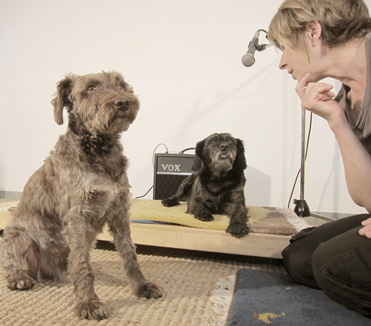Julie Andreyev, Associate Professor, Emily Carr University of Art + Design
PhD candidate, Graduate Liberal Studies, Simon Fraser University
Artistic Director, Interactive Futures
Presentation Summary
Applying Compassionate Interactions and Hyperbolic Ethics in Interspecies Collaborative Art
Philosopher Val Plumwood proposes that the current ecological crisis is a result of monologic rationalist culture. This Western rationalist framework can be seen as a form of doctrine that favours species identified with reason, resulting in a belief in hierarchical ranking of beings with humans at the top. This “anti-ecological narrative of reason” situates humans at the centre of ethical consideration and at the same time disqualifies nonhuman animals and nature from deep ethical consideration. Earth and Others seen through a rationalist lens, as resources, exist without agency, mind or the ability to produce knowledge. Plumwood argues for a comprehensive re-examination of culture to structure our relationships to nature employing two interconnected tasks: re-situating humans in ecological terms and reconsidering other-than-humans in ethical terms. A respectful, rather than manipulative, orientation towards Earth Others would involve a cultural shift towards reciprocity, generosity, communication and compassion.
Derrida questions the cultural and linguistic framework that sets humans apart from animals. He critiques the term ‘animal’, a problematic category defining all creatures in opposition to human, thereby erasing vast differences between species and individuals. He proposes a “hyperbolic ethics” calling for constant vigilance to distinguish between reactions to Others, created through cultural influences and power structures, and those responsive acts in relation to the individual. Hyperbolic ethics can be seen as a form of compassionate interaction with Others; a practice of “responding from the heart” (Derrida) that calls for constant evaluation of what we know and how we act.
Using my recent Animal Lover projects (www.animallover.ca), this paper will situate artistic practice in relation to Plumwood’s and Derrida’s proposed ethics. Some Animal Lover projects, use interspecies collaborative modes to reveal the expressive, emotive, communicative intentionality of companion dogs Tom and Sugi. The process can be seen as an applied ethics of openness rather than closedness in relation to Others, rethinking concepts of mind, communication and creativity. Aleatoric and improvisational methods provide for chance, open-ended expectation, surprise and learning; modes of “call and response” can be seen as demonstrations of hyperbolic ethics in action.
Bio
Julie Andreyev is an artist whose recent area of practice called Animal Lover (www.animallover.ca) explores animal creativity and communication through modes of interspecies collaboration and aleatoric methods, to produce interactive installation, video, social media, and performance projects. She works primarily with her two companion dogs Tom and Sugi (www.tomandsugi.com, twitter: @Tom_and_Sugi). She is co-founder of the Vegan Congress and has recently initiated a research project called the Compassion Network which joins research on compassion and the more-than-human world with researchers in universities across Canada. Her work has been shown nationally, in the US, Europe, China and Japan in galleries and festivals such as The Vancouver Art Gallery, SIGGRAPH, Vancouver 2010 Cultural Olympiad, Viper, CHI, Japan Media Arts Festival, Digital Art Weeks, Nuit Blanche. Andreyev’s work is supported by The Canada Council for the Arts, The British Columbia Arts Council, Foreign Affairs Canada, and The Social Sciences and Humanities Research Council of Canada. She is Associate Professor of Interactive + Social Media Arts at Emily Carr University of Art + Design in Vancouver, and Artistic Director of Interactive Futures, www.interactivefutures.ca.

